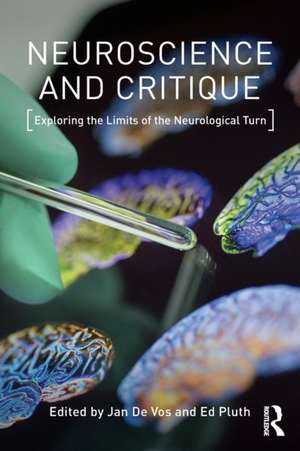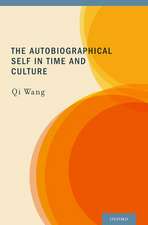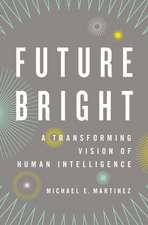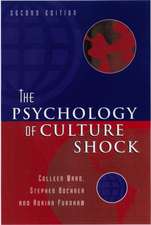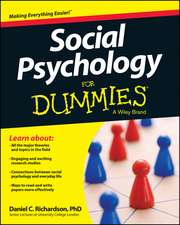Neuroscience and Critique: Exploring the Limits of the Neurological Turn
Editat de Jan Devos, Ed Pluthen Limba Engleză Paperback – 19 noi 2015
Neuroscience and Critique
is a ground-breaking edited collection which reflects on the impact of neuroscience in contemporary social science and the humanities. It is the first book to consider possibilities for a critique of the theories, practices, and implications of contemporary neuroscience.
Chapter 7 of this book is freely available as a downloadable Open Access PDF at http://www.taylorfrancis.com under a Creative Commons Attribution-Non Commercial-No Derivatives (CC-BY-NC-ND) 3.0 license.
| Toate formatele și edițiile | Preț | Express |
|---|---|---|
| Paperback (1) | 422.75 lei 6-8 săpt. | |
| Taylor & Francis – 19 noi 2015 | 422.75 lei 6-8 săpt. | |
| Hardback (1) | 1350.91 lei 6-8 săpt. | |
| Taylor & Francis – 24 noi 2015 | 1350.91 lei 6-8 săpt. |
Preț: 422.75 lei
Preț vechi: 445.00 lei
-5% Nou
Puncte Express: 634
Preț estimativ în valută:
80.90€ • 85.06$ • 66.84£
80.90€ • 85.06$ • 66.84£
Carte tipărită la comandă
Livrare economică 16-30 aprilie
Preluare comenzi: 021 569.72.76
Specificații
ISBN-13: 9781138887350
ISBN-10: 1138887358
Pagini: 244
Ilustrații: 5 black & white illustrations, 1 black & white halftones, 4 black & white line drawings
Dimensiuni: 156 x 234 x 13 mm
Greutate: 0.35 kg
Ediția:1
Editura: Taylor & Francis
Colecția Routledge
Locul publicării:Oxford, United Kingdom
ISBN-10: 1138887358
Pagini: 244
Ilustrații: 5 black & white illustrations, 1 black & white halftones, 4 black & white line drawings
Dimensiuni: 156 x 234 x 13 mm
Greutate: 0.35 kg
Ediția:1
Editura: Taylor & Francis
Colecția Routledge
Locul publicării:Oxford, United Kingdom
Public țintă
PostgraduateCuprins
Introduction: Who Needs Critique? Jan De Vos and Ed Pluth Part One: Which Critique? 1. The Brain: a Nostalgic Dream: Some notes on neuroscience and the problem of modern knowledge, Marc De Kesel 2. What is Critique in the Era of the Neurosciences? Jan De Vos 3. Who Are We, Then, If We Are Indeed Our Brains? Critique, Neuroscience, and Psychoanalysis, Nima Bassiri 4. Neuroscientific Dystopia: Does Naturalism commit a Category Mistake? Peter Reynaert Part Two: Some Critiques 5. From Global Economic Change to Neuromolecular capitalism, Jessica Pykett 6. What is the feminist critique of neuroscience? A call for dissensus studies, Cynthia Kraus 7. Brain in the Shell. Assessing the stakes and the transformative potential of the Human Brain Project, Philipp Haueis and Jan Slaby 8. Confession of a Weak Reductionist: Responses to Some Recent Criticisms of My Materialism, Adrian Johnston Part Three: Critical Praxes 9. The role of biology in the history of psychology: neuropsychoanalysis and the foundation of a mental level of causality, Ariane Bazan 10. Embodied simulation as second-person perspective on intersubjectivity, Vittorio Gallese 11. Empathy as Developmental Achievement: Beyond Embodied Simulation, Mark Solms Afterword 12. The Fragile Unity of Neuroscience, Joseph Dumit
Recenzii
'De Vos and Pluth deliver what is really needed today: a critique of neuroscientific reason in the strict Kantian sense. They avoid the twin trap of either succumbing to the fascination with brain sciences or their desperate humanist rejection. Instead, they ask the truly relevant questions about the exact status of neurosciences, as well as about their epistemological, ethical and political implications. It’s a book for those who still dare to think!' – Slavoj Žižek, University of Ljubljana, Slovenia
'The contributors to Neuroscience and Critique bring cutting-edge theoretical concepts and debates to bear on the claim that research in neurology can finally explain the formation and operation of our subjectivity. The ‘limits’ of the neuro-turn turn out to be intrinsic to our nature as human subjects, a nature that neuroscience caricatures as it attempts to capture it. This book intensifies the terms of critique so that we are able to see how we might escape neuro-reductionism while embracing the indeterminate and ethical choices that real ‘critique’ requires'. – Ian Parker, Psychoanalyst in Manchester and Professor of Management, University of Leicester, UK
'[Those] interested... will find Neuroscience and Critique likely to be one of the most stimulating and thought-provoking books they will have read in recent years... [If] your idea of "beach reading" is thoughtful, substantive, scholarly writing that takes you outside your usual reading ruts so that you return to your endeavors enriched--well, have I got a critique for you.' -Richard Ruth, George Washington University, PsycCritiques
De Vos and Pluth deliver what is really needed today: a critique of neuroscientific reason in the strict Kantian sense. They avoid the twin trap of either succumbing to the fascination with brain sciences or their desperate humanist rejection. Instead, they ask the truly relevant questions about the exact status of neurosciences, as well as about their epistemological, ethical and political implications. It’s a book for those who still dare to think! - Slavoj Žižek, University of Ljubljana, Slovenia
The contributors to Neuroscience and Critique bring cutting-edge theoretical concepts and debates to bear on the claim that research in neurology can finally explain the formation and operation of our subjectivity. The ‘limits’ of the neuro-turn turn out to be intrinsic to our nature as human subjects, a nature that neuroscience caricatures as it attempts to capture it. This book intensifies the terms of critique so that we are able to see how we might escape neuro-reductionism while embracing the indeterminate and ethical choices that real ‘critique’ requires. - Ian Parker, Psychoanalyst in Manchester and Professor of Management, University of Leicester, UK
'The contributors to Neuroscience and Critique bring cutting-edge theoretical concepts and debates to bear on the claim that research in neurology can finally explain the formation and operation of our subjectivity. The ‘limits’ of the neuro-turn turn out to be intrinsic to our nature as human subjects, a nature that neuroscience caricatures as it attempts to capture it. This book intensifies the terms of critique so that we are able to see how we might escape neuro-reductionism while embracing the indeterminate and ethical choices that real ‘critique’ requires'. – Ian Parker, Psychoanalyst in Manchester and Professor of Management, University of Leicester, UK
'[Those] interested... will find Neuroscience and Critique likely to be one of the most stimulating and thought-provoking books they will have read in recent years... [If] your idea of "beach reading" is thoughtful, substantive, scholarly writing that takes you outside your usual reading ruts so that you return to your endeavors enriched--well, have I got a critique for you.' -Richard Ruth, George Washington University, PsycCritiques
De Vos and Pluth deliver what is really needed today: a critique of neuroscientific reason in the strict Kantian sense. They avoid the twin trap of either succumbing to the fascination with brain sciences or their desperate humanist rejection. Instead, they ask the truly relevant questions about the exact status of neurosciences, as well as about their epistemological, ethical and political implications. It’s a book for those who still dare to think! - Slavoj Žižek, University of Ljubljana, Slovenia
The contributors to Neuroscience and Critique bring cutting-edge theoretical concepts and debates to bear on the claim that research in neurology can finally explain the formation and operation of our subjectivity. The ‘limits’ of the neuro-turn turn out to be intrinsic to our nature as human subjects, a nature that neuroscience caricatures as it attempts to capture it. This book intensifies the terms of critique so that we are able to see how we might escape neuro-reductionism while embracing the indeterminate and ethical choices that real ‘critique’ requires. - Ian Parker, Psychoanalyst in Manchester and Professor of Management, University of Leicester, UK
Notă biografică
Jan De Vos is a post-doctoral FWO Research Fellow at the Centre for Critical Philosophy of Ghent University, Belgium. His main research area is that of the neurological turn and its implications for ideology critique.
Ed Pluth is professor and chair of the philosophy department at California State University, Chico, USA. He works on issues and figures in contemporary continental philosophy, with special attention to how language and the extra-linguistic are put into relation to each other, and what this relation implies generally about the status of thinking and conscious life.
Ed Pluth is professor and chair of the philosophy department at California State University, Chico, USA. He works on issues and figures in contemporary continental philosophy, with special attention to how language and the extra-linguistic are put into relation to each other, and what this relation implies generally about the status of thinking and conscious life.
Descriere
Neuroscience and Critique is a ground-breaking edited collection which considers the impact of neuroscience on contemporary social science and the humanities. Bringing together leading scholars from several disciplines, the contributors draw upon a range of perspectives.
